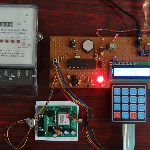Please find below the
Finalist Evaluation
Judges'' comments
Thank you for participating in the 2015 Climate CoLab Urban Energy Efficiency contest, and for the time you spent in creating and revising your entry.
The Judges have strongly considered your proposal in this second round of evaluation, and have chosen to not advance it as a Finalist for this contest.
We, the Judges and contest Fellows, are truly grateful for your contribution to the Climate CoLab and for your commitment to address climate change.
We encourage you to keep developing your work. Transfer it to the Proposal Workspace to re-open it, make edits, add collaborators, and even submit it into a future contest. You can do so by logging into your account, opening your proposal, selecting the Admin tab, and clicking “Move proposal”.
We hope you will stay involved in the Climate CoLab community. Please support and comment on proposals that have been named Finalists and vote for which proposal you would like to be nominated as the contest’s Popular Choice Winner.
If you have questions, please contact the Climate CoLab staff at admin@climatecolab.org
Keep up the great work. And thank you again for being a part of this mission to harness the world’s collective efforts to develop and share innovative climate change solutions.
2015 Climate CoLab Judges
Additional Comments:
1) It is only in highly developed societies are the individuals able to take action in reducing energy consumption. At the lower end of the economic pyramid the consumer has found ways to make sure that their energy consumption is within affordable ranges, but there consumption levels are low compared to the middle class. Unfortunately the middle to the middle class the cost of energy as a percentage of their incomes and total household expenses is too low to micro monitor yet they make up the third largest consumer after industries and commercial properties. In the past few months Neurio Home Intelligence neur.io/ a technology that does everything they propose to do and more has been taken through its passes, it would be prudent to look at the technology then localise it to the particular environment. As the Neurio gets to market they will be able to mass produce it and thus loser the costs substantially making it viable for developing nations.
2)My understanding is that this proposal is for the development of a device of some type to provide energy feedback. It’s not clear what the difference is between the two proposals – Domestic vs. Advanced Energy Planner. There is also little description of the physical device, and it’s not clear if an app could possibly be used instead that was accessed by smart phones or computers. And it’s also not clear how the device relates to the city where proposed. And the costs appear to be for development of a single device, not a program. However it does start down a path of a market-specific feedback device, and I’m certain that there will be an energy-saving response.
Semi-Finalist Evaluation
Judges'' ratings
| • | Novelty: | |
| • | Feasibility: | |
| • | Impact: | |
| • | Presentation: |
Judges'' comments
SUBJECT: Your proposal has been selected as a Semi-Finalist!
Congratulations! Your proposal, Advanced Energy Planner- A practical real time energy management scheme in the Urban Energy Efficiency contest, has been selected to advance to the Semi-Finalists round.
You will be able to revise your proposal and add new collaborators if you wish, from July 1st until July 14, 2015 at 23:59pm Eastern Time.
Judges' feedback are posted under the "Evaluation" tab of your proposal. Please incorporate this feedback in your revisions, or your proposal may not be advanced to the Finalists round. We ask you to also summarize the changes that you made in the comment section of the Evaluation tab.
At the revision deadline listed below, your proposal will be locked and considered in final form. The Judges will undergo another round of evaluation to ensure that Semi-Finalist proposals have addressed the feedback given, and select which proposals will continue to the Finalists round. Finalists are eligible for the contest’s Judges Choice award, as well as for public voting to select the contest’s Popular Choice award.
Thank you for your great work and again, congratulations!
2015 Climate CoLab Judges
Judges' Comments
Invention may be similar to existing Building Management System (BMS). Team AEP to provide clear Flow Chart to support how the planner works. Cost saving is not clear (How much cost savings) Clear taught on the deployment of AEP. Team AEP may look at piloting using a small community (say a University) or a well planned suburb during the year 1. That approach may help with the feasibility.
There seems to be a believe that power consumers are interested in monitoring their power consumption, I propose that this assumption be validated.
I drive my car every day but still cannot conclusively tell you what my fuel consumption is, so what will give me the impetus to want to monitor my energy consumption at home?
It is not so clear that the electricity board will be interested in reducing electricity demand. The impact on GHG emission reduction is not fully analyzed. The cost analysis also needs further work.
 Vaisakh Mg Jul 14, 2015 10:17 | Proposal creator
Dear Judges,
Thank you so much for selecting proposal as a Semi-Finalist!
Let me come to your observations.
BMS and AEP
Unlike BMS we employ forecasted energy consumption allowing the user to sacrifice energy consumption at cost of personal convenience to alleviate himself of the heavy forecasted bill.
So what we propose is a device that keeps alerting, forecasting and trusting the consumer with the information.
Coming to your example, If you know that you could afford say 1000$ of fuel expense for this month but your car tells you that at the rate of current usage you will end up paying 1500$, you are given enough information to avail other options like public transport benefiting both you financially and the world in terms of CO2 emissions/energy.
So what we propose is a win win..!! we believe no device or technology can alone handle and solve the energy scenario and save our planet, people are the key.
|
 Vaisakh Mg Jul 14, 2015 10:44 | Proposal creator
With 1.4 billion people of the world still having no access to electricity, we believe the concerned authority will be interested in reducing electricity demand.
The input for the AEP is obtained from the LED blink ( whose frequency depends on the current rate of usage) of the existing energy meter, the use of an optical sensor as an input medium allows the device to be of optimal service to user scenarios where the energy tabulating meter (Energy Meter) is located far away from the location of energy consumption. Once the data is obtained, rest is programmed depending on the existing slabs and tariff rates of the respective distributors.
|
